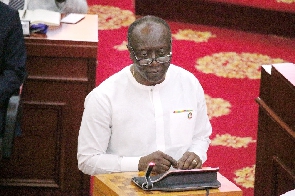 Finance Minister, Ken Ofori Atta
Finance Minister, Ken Ofori Atta
Finance Minister Ken Ofori-Atta failed to comply with the expenditure plan for Ghana’s oil revenue in 2018 in servicing debts, as approved by parliament in the 2017 budget statement, energy think tank, Africa Centre for Energy Policy (ACEP), has said.
ACEP, in its analysis of the 2019 budget statement and economic policy of the government of Ghana presented to parliament by Mr Ofori-Atta on Thursday, 15 November, explained that: “The net petroleum revenue over the period was $500,119,762. This was shared in accordance with the Petroleum Revenue Management Act (PRMA), Act 815, as amended. The Ghana Stabilisation Fund (GSF) received the highest amount of $226.6 million. The Annual Budget Funding Amount (ABFA) received $176.3 million while the Ghana Heritage Fund (GHF) received $97.2 million.
“The total BR projected for 2018 was $335.86 million. This was exceeded within the third-quarter of 2018 to $500.12million. However, the sharing of the actual petroleum receipts shows significant discrimination against the ABFA. While the ABFA was underfunded (25%), the GSF and GHF were overfunded by 221%.”
It added: “The balance of GSF was in excess of the $300 million cap by the end of 2017. Therefore, any further allocations to the GSF would automatically be transferred to either the contingency or Sinking Fund in accordance with section 23(3) and (4) of the PRMA.
“There was, therefore, no urgency to push more money into the GSF for further transfer into the Sinking Fund for debt servicing when the budgeted ABFA had not been met. The opportunity cost of pushing more money into the GSF is the forgone provision of the much-needed public investment through the ABFA.
“This deliberate engineering to push more petroleum revenues to debt servicing implies that the Minister in 2018 did not comply with the expenditure plan as approved by parliament per the Appropriation Act.”
ACEP further recommended that: “To check the deliberate use of oil revenue for debt servicing at the expense of public investments, the regulations to the PRMA should be passed to define rules for capping the Ghana Stabilization Fund (GSF). This will bring clarity to the basis for capping and remove perceived discretionary powers of the Minister in the treatment of oil revenues and the GSF.
“To prevent encumbrances of unutilized ABFA, the Ministry of Finance must ensure that existing infrastructure projects yet to be completed are adequately funded by the ABFA. Fully utilizing ABFA will prevent time and cost overruns of existing uncompleted projects.
“Linked to the proposed solution to prevent encumbrances on the ABFA is the need for detailed annual expenditure planning with clear timelines for projects under the priority areas. This must be published together with the budget to enable CSOs to track ABFA investments. ACEP proposes that the 2017 ABFA balance should be used to fund one major national project that all citizens can identify with.”